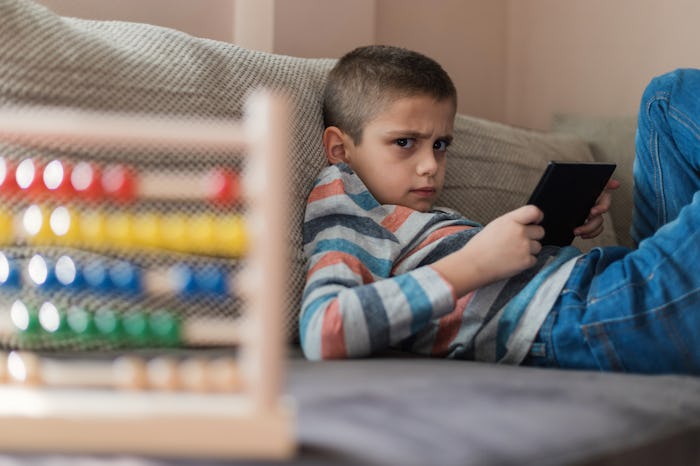Life

Parenting A Kid Through Their Bad Attitude Takes A *Lot* Of Love, Experts Say
Something happened to my sweet boy between elementary and middle school, and I'm not a fan. He's more surly, quick to anger, and a lot of the time? His attitude just sucks. I was not prepared for this, and I'm not sure how to parent a kid with a bad attitude.
I understand that he's going through a lot of changes in his life right now. He just started a rigorous middle school curriculum, he doesn't know anyone there, and it's upended his comfortable routine. On top of that, he's 11. His body is beginning to take on a whole soup of hormones, and he is probably uncomfortable with what he is noticing day to day. Not that it excuses his attitude — because it doesn't — but it does help me when I am trying to extend the grace to him that he desperately needs.
Dr. Dara Bushman, a licensed clinical psychologist, tells Romper that the ability to extend that grace and understand our children begins within ourselves. "Look hard in the mirror and ask yourself the example you are setting, as children are often a product of their environment," she says. I will be the first to admit that I don't always have the best attitude, so it's likely my son is at least, in part, reflecting back what he sees in me. If I've been on the struggle bus, I can get snippy and sarcastic, and that's one of my worst qualities.
Bushman notes that parents need to have a reserve of love, a place from which we can draw into ourselves all of the positive emotions that are associated with being a parent — all of the love and good vibes available to us. Having this allows us to express to our children how much they mean to us, even when we've had it up to our noses with everything else, including them. It's not going to work perfectly all of the time — nothing does — but building those reserves and learning to tap into them is an exercise in experience. The more you put into it, the more you can draw from it. The ability to find that compassion when your son is slamming his bedroom door, or telling his sister that he hates her because we make him play Minecraft with her, isn't always easy, but it is always helpful when managing that attitude.
Bushman says that parents need to focus communicating with their children their "truth and concerns with authenticity and with sincerity." And that you need to employ the golden rule with them as much as you do with anyone you want to have a good relationship with by talking to them how you would want to be talked to. I get that when your kid is telling you that you are "the worst mom alive" because you turned off his Xbox, and had the absolute audacity to demand that he accompany you to buy shoes for him, it is a tad difficult to voice your truth in a calm manner. Truthful, sure. Authentic? Absolutely. Calm? Well I'm no Fraulein Maria. (I may have threatened to skip the da*n Nike store entirely, telling him I'd be buying him three pairs of camo print crocs for the same price. Not my finest moment.)
It was a parenting stumble, but it wasn't something unrecoverable. Bushman says that if you're open to compromise and you collaborate with your kids, you can thwart many of these riffs before they happen. "Focus on solutions of moving forward to draw your attention towards new possibilities," she says. "If you sit around mulling about how things should be, all energy stays in the negative." In hindsight, I should have set the intentions of the day earlier, so that he wouldn't feel like I was being disruptive.
Kids thrive on routine, even if that routine is play. Shopping isn't something my son has ever liked, so pulling him from the thing he loves the most to do the thing he likes the least was bound to cause problems. I should have warned him earlier, allowing him to plan his time accordingly. If he failed to do so, then I would need to regroup, and, hopefully, avoid empty threats revolving around particularly grotesque plastic footwear. (That my daughter adores, I think, just to spite me.)
Don't take your kid's attitude personally, says Bushman. They are learning to navigate big feelings, and you are their safe space. They know that you love them unconditionally, so you are the place where they can test boundaries. That's actually a pretty big deal, and means they don't fear your reprisal. Bushman says that you need to collaborate with your child to help them understand what is happening and that "if your child does not share the same perspective, it does not mean nothing will change. It only means it is not happening or you are both sharing the same perspective right now."
Take a few deep breaths, find your inner calm, and work through it with them. "Identify intentions versus expectations. Intentions have flexibility and alternative options," says Bushman, and that can mean the difference between a blow up and a calm interaction, which is what you are trying to do when you're exploring how to parent a kid with a bad attitude. The challenge and practice of it will undoubtedly be worth it in the long run.